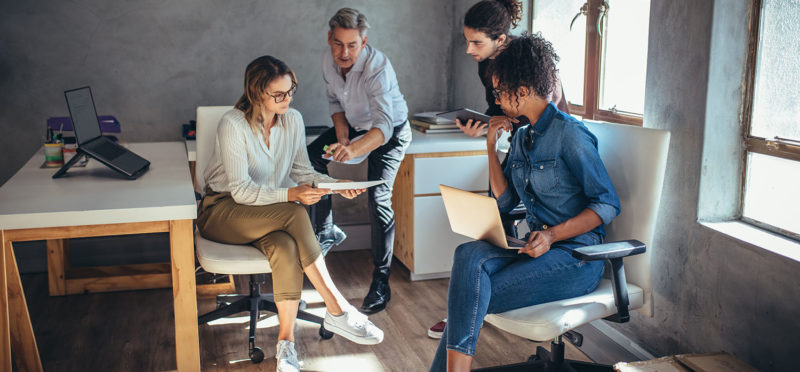

Tips to make meetings more productive
Have you ever had the feeling that you are wasting time while attending a meeting with your teammates and/or your boss? You are in the meeting, but are you thinking about other things? Can these sensations be avoided by making meetings more efficient? We try to explain how.
According to team building and leadership specialists, one of the essential issues is to be clear about why you are calling a meeting. Sometimes, we have the feeling that we are in that room, simply because you have been told to or because it’s on the calendar, without a defined objective.
Nowadays, and after everything that has happened in the last year, there are also those who distinguish between the organisation of face-to-face meetings and virtual meetings, given that the latter are not always easy to control, either because everyone is talking at the same time or because the attendees’ connections start to fail.
But in any case, the essential guidelines are the same:
- Before convening a meeting, whether it is face-to-face or virtual, we must be clear about the objective: What do we want to achieve? Is it really necessary?
- If possible, it should be planned with enough time to inform the interested parties, so that they can prepare for the meeting as well as the convenor, and so that the time is used to the maximum. Similarly, if necessary, it is advisable to provide attendees with the necessary documentation.
- The invitation should only reach the essential people. There is no point in having 20 people attending if only 5 are really interested and/or affected. For the company, time is money, and it is not productive to have a lot of people as forced spectators.
- Calculating the duration of the meeting is also important to avoid it taking longer than necessary, and obviously you have to be punctual in order to keep to the timetable. When calculating the duration of the meeting, we must think about setting aside time for requests and questions that can be asked at the end of the meeting.
- The space where the meeting is held, in the case of face-to-face meetings, must be adequate for the number of people convened, and must have all the technological and analogue tools necessary to clearly set out all the issues to be discussed.
- Once in the meeting, we have to assign the “role” that each of the attendees has to assume, if the interventions have to be marked. What is clear is that there must be a moderator, who will usually be the convenor, to avoid diluting the objective for which we are meeting.
- For a correct development, before starting, the moderator must read the agenda in order to be clear about the issues to be discussed or resolved, and make clear the reason for the meeting. From this point onwards, he or she must ensure that the time allocated to each of the topics and speakers is respected, so that the established timetable is adhered to and everyone can make their points.
- Once all the scheduled interventions have been completed, it is time for Q&A, in order to polish the topics dealt with, resolve any doubts that may have arisen, and decide whether any new contributions should be made before ending the session.
- In the closing session, it is important to define the conclusions drawn, as well as the solutions to the problems that have arisen during the meeting, and the deadlines for carrying out the actions to be undertaken.
- Finally, it is important to draw up a summary or a record of the minutes that includes everything that has been presented, interventions, conclusions, and even details the decisions that have been taken and the actions that must be carried out from now on.
The achievement of all these premises should guarantee effective and efficient internal meetings, meetings with suppliers and meetings with clients, so that we do not end up with a feeling of wasted time. It is especially important to make the most of time in order to achieve productivity and efficiency objectives that generate the economic benefits necessary for the survival of an organisation, thus guaranteeing the professional and personal stability of all those involved.
Do you want to be the first to receive the latest news about 11Onze? Click here to subscribe to our Telegram channel





Moltes gràcies pels consells, es el típic q sol passar als meetings q s’oblida algun d’aquests aspectes i queda poc efectiva la reunió quan podria ser més útil.Merci
Moltes gràcies pel teu comentari, Jordi!!!
👏
Gràcies, Daniela!!!
👍👍
Gràcies, Joan!!!
Una interesant esplicacio
Celebro que t’hagi agradat l’article Maria. Ens llegim a La Plaça.
👌Aplicable a qualsevol tipus d’ organització
Exacte Mercè, la sensació de pèrdua o de no aprofitament del temps, es dóna en moltíssims àmbits.
Molt be 👍
Gràcies Josep!!
Molt ben resumit… però cal que tothom prengui consciencia del seu temps i el de l’altre. Així com de fer partíceps a tothom, ja que és molt més fàcil desconectar-se, on tendim tots a dispersar-nos o pensar en el que faras al plegar
Totalment d’acord Laura, per això és important intentar no dispersar-se durant les reunions, i que tothom tingui clar el seu paper.
Això m’anirà molt bé per les meves reunions de la meva ONG. Gràcies.
A disposar Jordi, celebrem que consideris que et serà útil. Gràcies per seguir-nos.
Aquestes reunions han de ser molt interesants per no perdre l’atenció i et puguis desconectar sense voler.
Ben d’acord! O importants, o ben portades. Gràcies per l’interès i els teus comentaris
Tal qual es la milor manera i tot i així de vegades anar per les rames rs la tendència
És una conducta molt llatina, Alícia. Ens veiem a La Plaça.